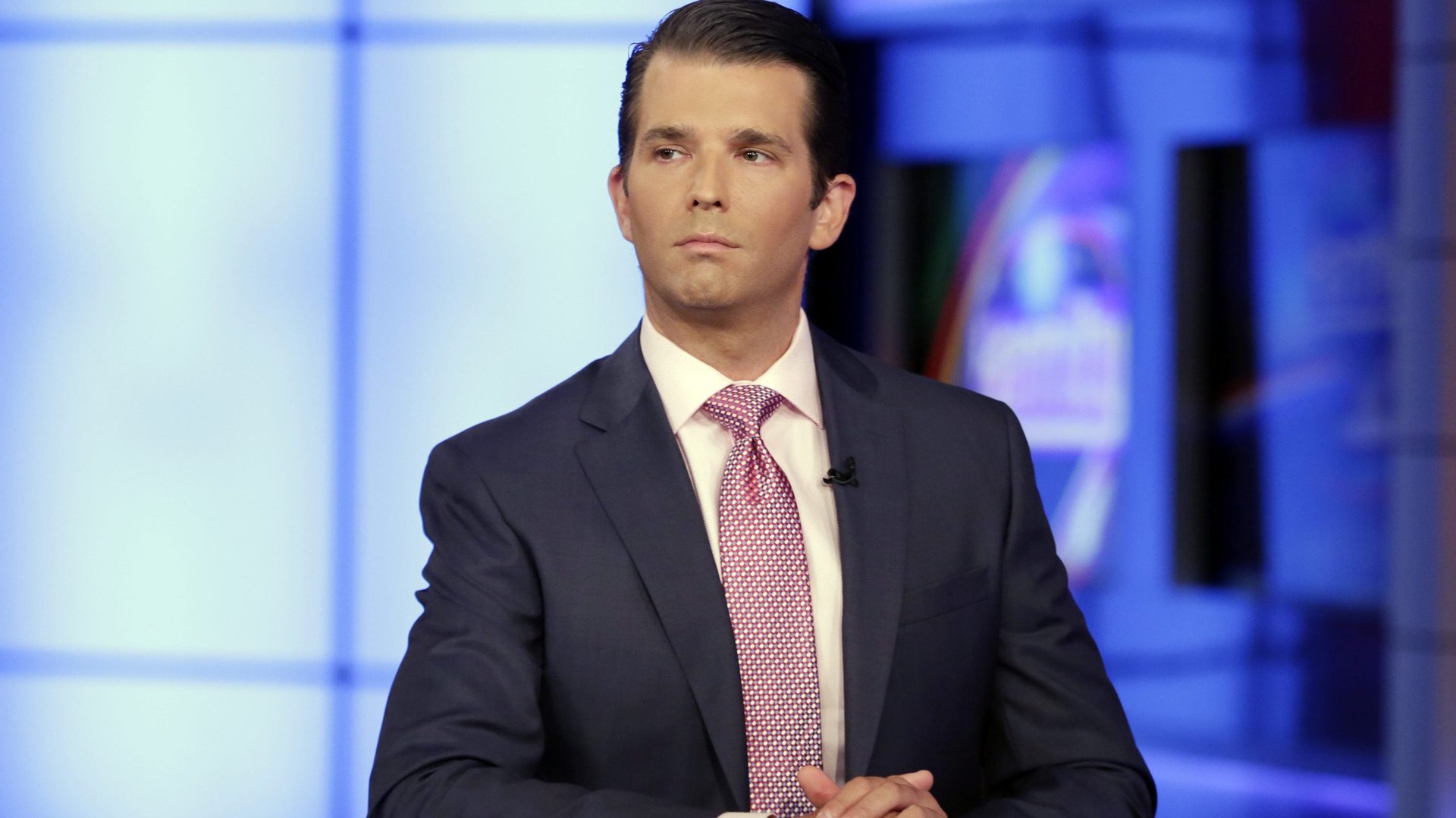Russia has tried to collude with US campaigns before—what’s shocking is that Trump Jr. went for it
Donald Trump has long denied colluding with the Russian government during the 2016 US election. But it’s going to be tough for the president to deny this week’s news.


Donald Trump has long denied colluding with the Russian government during the 2016 US election. But it’s going to be tough for the president to deny this week’s news.
Over the past few days, Donald Trump, Jr. has admitted to attending a campaign meeting with a Russian lawyer promising to provide dirt on Hillary Clinton. Email records, which Trump Jr. posted on Twitter, show that the intermediary organizing the meeting explicitly said the information was “part of Russia and its government’s support for Mr. Trump.” Trump’s former campaign manager Paul Manafort and his son-in-law and close advisor Jared Kushner also attended the June 2016 meeting with the Russian lawyer, Natalia Veselnitskaya.
As analysts debate whether Trump Jr. committed any crimes in meeting with Veselnitskaya, it’s clear that we are in an unprecedented situation. But the most remarkable thing here isn’t that the Russian government attempted to conspire with a preferred candidate. It’s that the Trump campaign actually decided to take them up on it—an extraordinary break from the way prior US presidential candidates have responded when Moscow offers a helping hand.
Consider the memoir of Anatoly Dobrynin, who served as Moscow’s ambassador to the US for nearly a quarter-century. Dobrynin worked through the Cuba missile crisis and the space race, through the assassination of John F. Kennedy, through Vietnam, Angola, and Afghanistan. As seasoned a diplomat as any, Dobrynin was rarely shaken. But even he reports being shocked in 1968, when he learned that his higher-ups decided that the Kremlin would offer Democratic presidential candidate Hubert Humphrey “any conceivable help in his election campaign—including financial aid.”
For Dobrynin, the decision smacked of myopia. If anyone got a whiff of Soviet aid, it “certainly would have backfired and ensured Humphrey’s defeat,” he wrote. And he was galled by the idea of domestic interference in the affairs of a Cold War foe. But he broached the topic with the Democratic candidate. While joining Humphrey at his home for breakfast—a meeting that, unlike Trump Jr.’s, wasn’t predicated on any nefarious offers—Dobrynin began hinting at the Soviet Union’s willingness to help defeat his opponent, Richard Nixon. Humphrey, however, wouldn’t hear of it. He reportedly told Dobrynin that Moscow’s well-wishes would suffice. Moscow’s efforts to intervene, Dobrynin concluded, “got nowhere.”
In 1960, the KGB’s lead in Washington was rebuffed in similar efforts to aid the Kennedy campaign. The Kremlin instructed its Washington KGB resident, according to archival documents, to offer diplomatic [measures], propaganda, “or any other measures” in order “to facilitate Kennedy’s victory.” But Kennedy’s campaign closed ranks, and Moscow’s man couldn’t even get a sit-down with the candidate.
Meanwhile, in 2017, Trump Jr. isn’t denying that he anticipated he would gain ammunition against Clinton from the Russian source. He’s only objecting to the idea that he was wrong in doing so, and that, anyway, it was a waste of his time. As New York Magazine’s Jonathan Chait wrote, the “Trump campaign took a meeting with Russians who promised to supply them with damaging information on their opponent. This is the defense.”
Trump partisans like Sean Hannity have already primed their audience with claims that collusion isn’t a crime. They’re asking their audience to ignore the fact that Trump’s campaign was told in an email that a “Russian government attorney” wanted to dish disinformation on Clinton. They’re asking their audience to ignore the myriad legal analysts who say Trump Jr. may well face prosecution for his actions.
Still, even if Trump Jr. faces no legal repercussions, his actions—and his father’s campaign team—have battered yet another norm underpinning American democracy. As any rudimentary philosophy student will tell you, legality doesn’t necessarily connote what is right. A legal text is not a summation of American ethics. Former US candidates didn’t need the law to tell them that conspiring with a foreign government to defeat a political opponent was a very bad idea.
Humphrey, who Dobrynin described as a “very intelligent … very clever man,” knew enough—and was patriotic enough—to nip Soviet efforts to supply aid in the bud. But Trump is no Humphrey or Kennedy. He’s a man who has shown, time and again, that he has little regard for the norms of statesmanship, and whose inner circle has proven willing to work with US adversaries in order to gain an edge over a domestic opponent.
It’s possible president Trump knew nothing of the emails or the meeting, and that Trump Jr. acted of his own accord. But we know now that you can’t spell “collusion” without “son.”